Iran Determined To Block All Information Channels: RSF
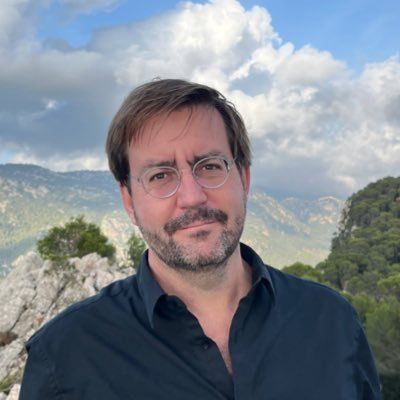
As scores of journalists have been arrested during the protests in Iran, Reporters Without Borders (RSF) announced that the Islamic Republic is determined to block all information channels.

As scores of journalists have been arrested during the protests in Iran, Reporters Without Borders (RSF) announced that the Islamic Republic is determined to block all information channels.
Referring to detention of journalists in Iran, the RSF Executive Director Christian Mihr said Wednesday "It is important that the world learns about the brutality of the Iranian regime."
He said despite the arrests and threats to journalists in Iran, they "bravely continue to do their work."
According to the organization, since uprising against the regime in Iran, at least 55 journalists, including 16 female ones, have been arrested, and 27 of them are still behind bars.
The RSF further went on to say that 28 others were set free with large bails, but heavy prison sentences have been issued for a number of journalists.
Since the beginning of 2023, eight journalists have been arrested and four of them have been temporarily released on bail.
The Committee to Follow up on Situation of Arrested Journalists has prepared a list of these people saying at least 24 journalists are still under arrest.
Elaheh Mohammadi and Niloufar Hamedi, who published the news about the death of Mahsa Amini in police custody for the first time, are among the ones behind bars.
After their arrest, the Intelligence Organization of the Revolutionary Guard and the Ministry of Intelligence issued a joint statement accusing the two of espionage.
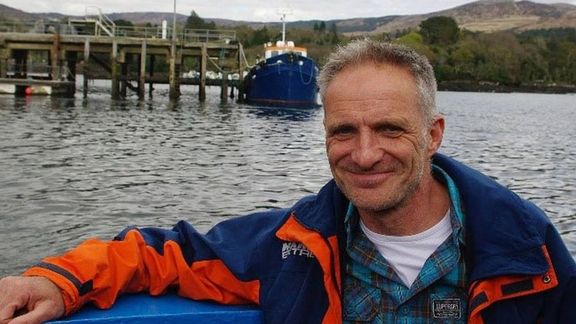
France says the Islamic Republic must release the Franco-Irish citizen Bernard Phelan immediately and provide him access to urgent medical care.
The Foreign Ministry on Thursday said Phelan, who is detained in Iran, must be set free as soon as possible.
Foreign Ministry spokesperson Anne-Claire Legendre told journalists that Paris is very concerned about Phelan’s poor health condition.
"The denial of medical access by Iranian authorities is unacceptable", she noted.
Several European citizens are imprisoned in Iran, but only the names of some of them have been published.
Bernard Phelan was arrested on October 3 during anti-regime protests that have swept the country following the death of Mahsa Amini in police custody on September 16.
He has been on hunger strike since the beginning of the New Year, but on Friday he accepted to eat upon the request of his family.
However, Phelan warned if there is no improvement in his situation, he will go on hunger strike again.
Bernard Phelan, 64, who is a travel consultant has been accused by the Islamic Republic of "propaganda against the establishment" and "photographing police and security officers". He is imprisoned in Vakil Abad prison in Mashhad northeast of Iran.

Russia pounded Ukraine with missiles and Iranian drones in waves of attacks Thursday, killing at least 11 people, damaging buildings and energy facilities.
The attack came one day after Ukraine secured pledges of main battle tanks from Germany and the United States to beef up its troops - a move that infuriated Russian officials.
The military said its air defences shot down all 24 drones unleashed by Russia overnight. Fifteen of them were downed around Kyiv where there were no reports of any damage, they said.
Iran’s Islamic government has supplied hundreds of drones to Russia since mid-2022 that have been used during missile attacks to inflict more damage or to swamp Ukrainian air defenses. The United States and Europe have imposed new sanctions on Tehran for its expanded military ties with Moscow and also its deadly crackdown on protests since last September.
Air defences shot down 47 of 55 missiles that included at least one Kh-47 Kinzhal hypersonic missile, General Valeriy Zaluzhnyi, Ukraine's top military commander, said.
As many as six Tu-95 strategic bombers launched long-range missiles after taking off from the Arctic region of Murmansk in northern Russia and launched long-range missiles, Air Force spokesperson Yuriy Ihnat said.
Prime Minister Denys Shmyhal said Russia's main target had been energy facilities and that the strikes aimed to deprive Ukrainians "of light and heating" with the temperature in Kyiv at below freezing.
With reports by Reuters
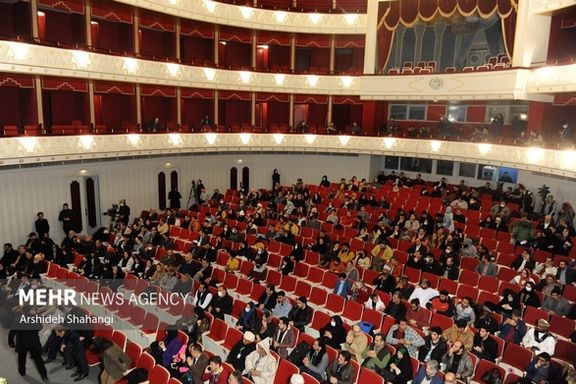
Iran’s Fajr Film Festival, the Islamic Republic’s biggest, has been snubbed by moviemakers and moviegoers amid ongoing protests all over the country.
The film festival is part of a series of events to mark the 44th anniversary of the Islamic Revolution marked by 10 days of state-sponsored ceremonies dubbed the decade of Fajr – which literally means dawn.
The trio of festivals – along with a theater and a music festival – have faced boycotts by numerous artists and art enthusiasts in recent years, but the current wave of protests and the regime’s heavy-handed crackdown seems like the coup de grâce to the most significant propaganda gala of the Islamic Republic.
Despite the government’s efforts to portray the events as popular as they used to be a decade ago, the theater festival was inaugurated in the sparsely attended Vahdat Hall this week.
It is ironic that even the most “prestigious” cultural events of the Islamic Republic are held in halls constructed prior to 1979 in the era of monarchy, as the clerical regime never truly invested in culture, and considers most of its representations un-Islamic except for a couple of weeks during the celebrations for the establishment of the Islamic Republic.
Even though photos of the empty hall during the theater festival’s opening ceremony were reported even by state media and outlets affiliated with the Revolutionary Guards, Mohammad Mehdi Esmaili, the Culture and Islamic Guidance minister, said that the event was welcomed by the people.
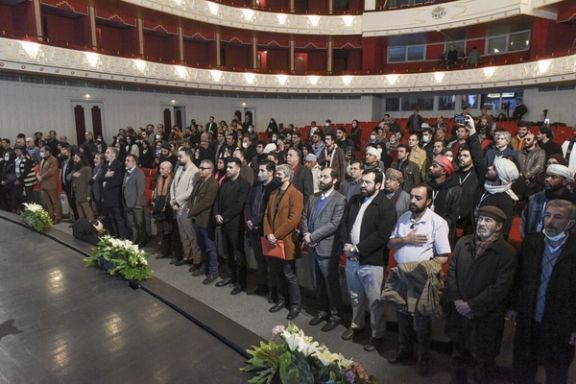
Since the beginning of the ongoing uprising in mid-September, many celebrities were banned, arrested or summoned by the judiciary for their solidarity with the current movement. Some of the most popular actors and artists even emigrated from the country to be able to express their support for the antigovernment protests freely and without fear of arrest.
Many actors and filmmakers had announced their boycott of the festival weeks before the start of the event, prompting the authorities not to announce the films selected to be screened during. Something unprecedented that took place this year was that the tickets for the movies were sold without the names of the works, because the government feared that if it announced the flicks, more artists would announce their opposition to the event. Of course, their trick turned out to be ineffective as some actors actually announced their boycott after their films were selected for screening, such as Haniyeh Tavassoli. Most of the actors, actresses and even directors do not have a say in the screening their movies because almost all of the productions in Iran are sponsored by state organizations.
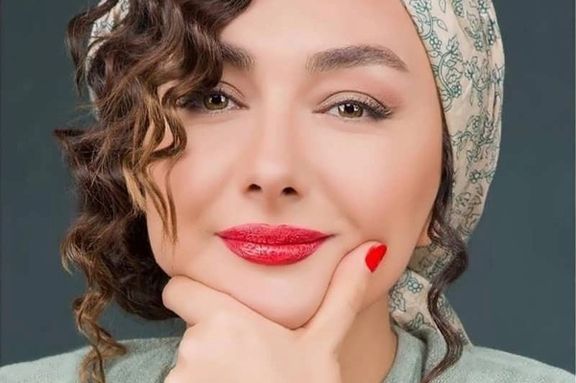
The festival had always been dominated by the works produced by government organizations and propaganda institutes but this year the level of audacity of the regime is even higher as authorities have announced that no movies that draw a grim portrait of the society were selected for screening. The committee tasked with selecting the movies is comprised of regime insiders, some of whom were not even film industry figures, such as Reza Pourhossein, a cultural manager and a professor of psychology at the University of Tehran.
The secretaries of the festivals and their juries are also selected from the figures close to the regime and known for works that promote regime propaganda, such as the secretary of the film festival Mojtaba Amini, a producer who was involved in the attacks on the Saudi embassy when it was ransacked by IRGC’s basij militias in January 2016. The secretary of the Theater festival called those who boycott the event “cultural dictators” at the opening ceremony.
The antigovernment protests, coupled with economic woes and political uncertainty, have clouded the cultural landscape of the country so much that the culture minister was reported asking theater directors and singers to start holding performances so that the regime can pretend the situation is back to normal.
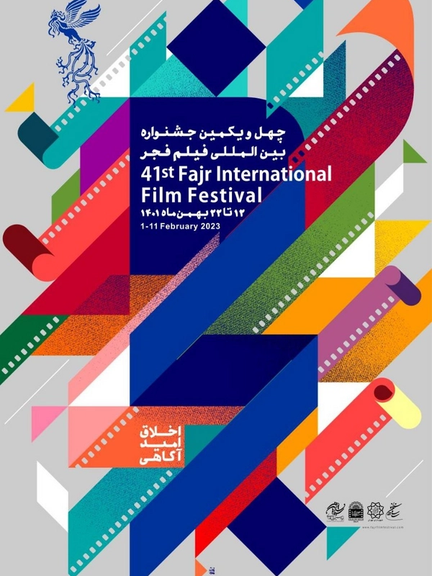
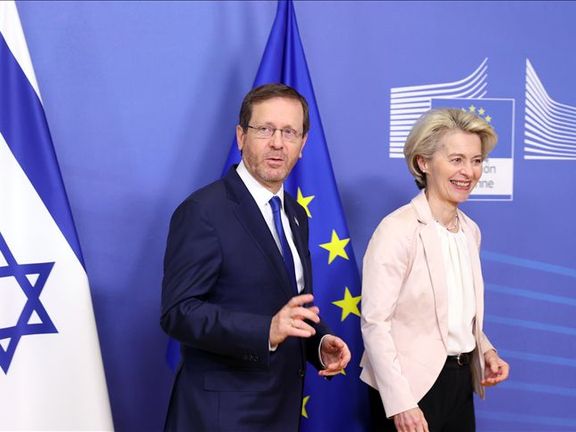
Israeli President Isaac Herzog has called on Europe to take a firm stance against Iran as it poses a challenge to Israel, the region, Europe, and the world.
Herzog made the comments Wednesday in a meeting with European Commission President Ursula von der Leyen in Brussels.
“Iran is fighting Ukrainian citizens by supplying drones and lethal weapons, endangering the world by rushing toward nuclear capabilities, killing and torturing its own citizens,’’ he stated.
Earlier this week, the European Parliament approved a resolution with absolute majority to designate Iran’s Islamic Revolutionary Guard Corps (IRGC) as a terrorist organization. However, the EU refused to do so, with its Foreign Policy Chief Josep Borrell saying the move needs a ruling by a European court.
The West on Monday stepped up pressure on Iran over its crackdown on protests and arms supply for the Russian invasion of Ukraine. The US, the European Union and United Kingdom imposed fresh sanctions on Tehran.
Members of the European Parliament as well as Iranians have called on European politicians to declare the IRGC as a terror group, as it is responsible for leading most of the security forces who killed, maimed and arrested protesters.
The issue of Europe listing the IRGC emerged in recent weeks as the Iranian regime has killed more than 500 people during popular protests that started in September, after the death of Mahsa Amini in hijab police custody.
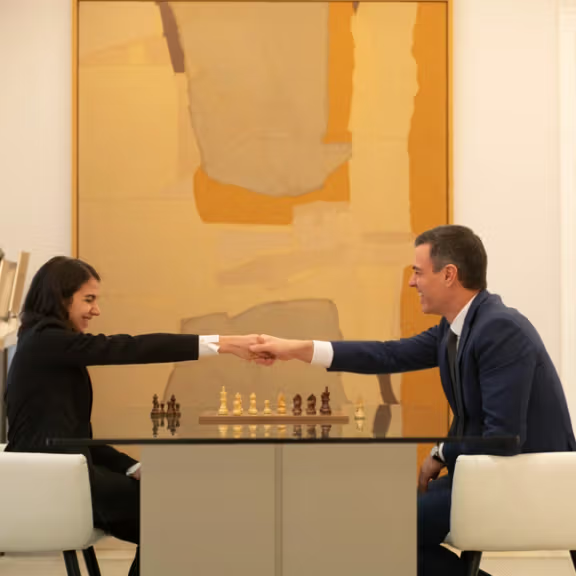
An Iranian chess player, who defected to Spain after she competed without hijab, has met with Spanish Prime Minister Pedro Sanchez in Madrid.
Sarasadat Khademalsharieh arrived in Spain in early January after having made a bold statement in Kazakhstan's capital Almaty, where she had participated in the FIDE World Rapid and Blitz Chess Championships without wearing the compulsory hijab.
"How much I have learned today from a woman who inspires me," Sanchez posted on his Twitter account after hosting Khadem at his official residence Wednesday.
"All my support to women athletes. Your example contributes to a better world," he added.
In footage provided by the prime minister's office, Khadem is seen chatting with Sanchez without wearing a hijab. They later appear to engage in a game of chess.
In the past four years, dozens of Iranian athletes have defected to other countries in objection to Islamic Republic’s restrictive policies, including compulsory hijab for women during matches and a ban on competing against Israeli athletes.
Anti-regime protests against clerical rulers have been going on for more than four months when a 22-year-old Kurdish woman, Mahsa Amini, was killed in police custody for wearing "inappropriate attire".
The US-based Human Rights Activists News Agency (HRANA), one of the groups that monitors and publishes daily statistics about the protests, said Tuesday that 525 protesters have been killed from September 17 to January 23, including 71 children.